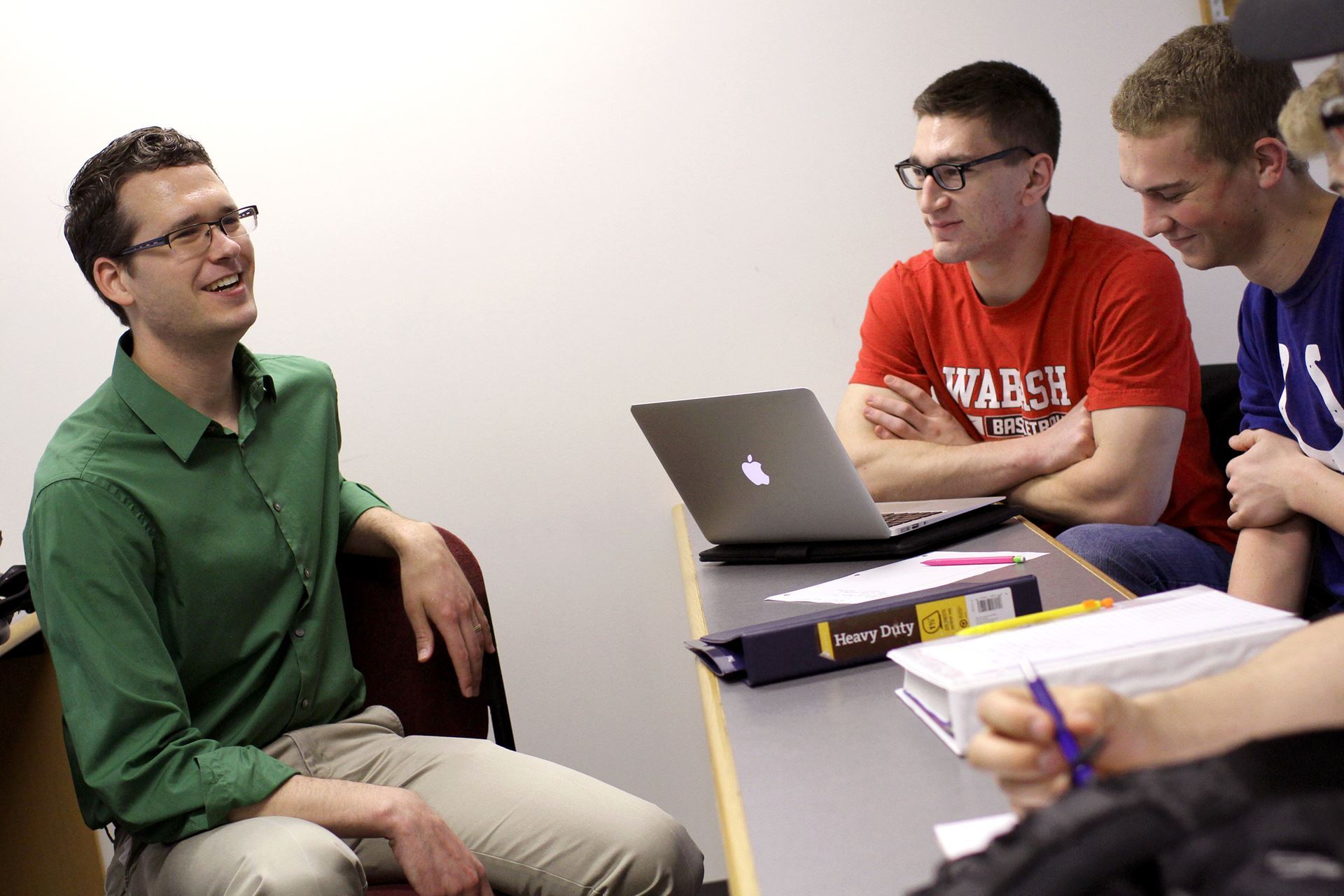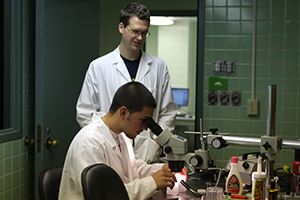 School name: Wabash College, Crawfordsville, IN
School name: Wabash College, Crawfordsville, IN
Type of school: Small (<900 students), all-male liberal arts college
School locale: Crawfordsville is a small city of about 16,000, located about a 50 minute drive from Indianapolis and about a 2.5 hour drive from Chicago
Classes you teach: Behavioral Neuroscience, Introduction to Psychology, Research Methods & Statistics, Human Sexual Behavior, Drugs & Behavior
Average class size: Usually small, but a bit variable! My largest class is Introduction to Psychology (typically capped at 40 students, but often with approximately 30 students), but this semester, I have one advanced course with 7 students, a first-year seminar with 15, and will have a half-semester course with approximately 20 students starting in October.
What’s the best advice about teaching you’ve ever received?
I am not sure if I can recall one specific piece of advice, but I do feel that I have been fortunate to have an excellent community of mentors and colleagues here at Wabash, and in my earlier teaching positions (as a visiting professor at Knox College, and as a graduate student at the University of Minnesota). In each of my institutions, I have been grateful for the advice and support I found when I had concerns in my teaching and other professional work. Recently, though, one question that I recall being posed at a conference session (on how to structure a faculty development program) has been resonating with me: How can we make the best use of our limited time? As I enter mid-career, I find it just as much of a struggle to do everything that I think should be done. I think this is true for many of my colleagues as well, and we are all looking for ways to focus on our core work of educating students, while also balancing our service and research. I find questions such as this one to be very useful, especially as the semester ramps up, as an opportunity to step back and reflect on how well my activities – how I spend my time – matches my priorities.
What book or article has shaped your work as a psychology teacher?
Earlier in my career, I think I was most influenced by P. F. Kluge’s Alma Mater, in which Kluge describes his experiences teaching at Kenyon College, his alma mater. I read the book as an undergraduate, and I found the portrait of the college professor presented by Kluge to be compelling, and one that I had in mind as I took my first full-time teaching position as a visiting professor (at my alma mater, Knox College). More recently, I have found myself often returning to Maryellen Weimer’s work, especially her posts on the Faculty Focus blog. As Wabash College’s Coordinator of Faculty Development, I have found the Faculty Focus pieces to be very useful in my own teaching, and as resources to share with my colleagues.
 Briefly tell us about your favorite lecture topic or course to teach.
Briefly tell us about your favorite lecture topic or course to teach.
My main research is in the neuroscience of learning and memory, and I especially enjoy talking with my students about memory in my behavioral neuroscience courses. I find memory, such a critical part of our identity, to be endlessly fascinating, and I always enjoy getting the opportunity to talk with students about what we know about the physical processes that support memory: what is it about our brains that allows us to lay down some lasting trace? Why does memory sometimes fail us? What can we do to intervene in disorders that impact memory? Like many areas in neuroscience and psychology, I feel that we are living through an opportune moment, in which we have learned a great deal about these processes, but that there are still many exciting puzzles to solve about memory.
Briefly describe a favorite assignment or in-class activity.
Last year, I experimented with having students self-grade their exams, after having a conversation with a colleague in our department who was interested in the technique. It was the first time that I had used the technique, but I found it especially interesting after coming across a journal article by Nelta Edwards on using self-grading in a social sciences statistics course. I found the experience very useful, though admittedly time-consuming, as I dedicated most of a class session to having students grade each question on their own exams. When looking over the scores students gave to themselves, I found that I largely agreed with my students’ self-assessment (though, I was likely influenced by my awareness of the scores students had given themselves). I did find that students who I assigned low scores in some cases overestimated their performance (which can be a useful opportunity for conversation, to help students be better able to recognize what a strong answer should look like), and in some cases, I was able to correct an important misconception that a student had, but was not clear from the answer given on the exam, so that self-grading became another opportunity for review and learning.
What teaching or learning techniques work best for you?
I prefer smaller discussion-based courses, or smaller courses in which I combine short periods of lecture with discussion, where students have opportunities to make sense of class material and put it into their own words. The challenge, however, is to ensure that students are keeping up and engaging with the readings (and are prepared for discussion). So, I have moved towards the use of low-stakes reading responses and reading quizzes (to help me quickly assess my students’ preparation), but also to scale back some more dense and technical readings (or provide reading guides) in some of my upper-level courses.
 What’s your workspace like?
What’s your workspace like?
Outside of class, most of my work is done in my office. I prefer to have an open space, where I can easily meet with students. So, I have placed my desk and computer against a wall, and have several chairs and a small side table arranged around the room, allowing me to meet with one to three students easily. I prefer this style to one where I have a desk between myself and my students, which would feel more formal than I typically want my meetings to be. In my neuroscience courses and in summer research, I spend a fair amount of time working in our behavioral neuroscience lab with my students, which has several open spaces that I can configure for work in behavioral testing or other lab work.
What is your teaching philosophy in 8 words or fewer?
Learning how to learn is a critical outcome.
Tell us about a teaching disaster (or embarrassment) you’ve had and how you dealt with the situation.
One that comes to mind was not in one of my own courses, but one of my colleagues’ classes. Several years ago, I agreed to hand out an exam in a section of Introduction to Psychology while a visiting faculty member was out of town for a job interview. But, when the day came I forgot about the exam, and did not arrive until well after the class should have started. By that time, many students had left, and it was too late to hand out the test. I felt terrible about the error, and my main concern from that point on was to ensure that the students in the course knew that the error was mine, and did not believe that their professor had failed to show up.
What is something your students would be surprised to learn about you?
I think that some of my students might be surprised to learn that I was the first member of my immediate family to earn a bachelor’s degree (from Knox College, in Illinois), and that I was a Pell Grant recipient (along with other need-based aid). Some have seen a talk that I gave at Wabash, but many students would probably also be surprised to learn the origins of my last name, Schmitzer-Torbert – my wife and I chose to hyphenate our last names, and I was originally the Torbert, and my wife was the Schmitzer.
What are you currently reading for pleasure?
In August, I started reading George R. R. Martin’s A Game of Thrones, but now that the semester is in full swing, I may not be able to finish it for some time! However, I am fortunate this fall to be teaching a first-year seminar, which I have designed around how we can use science fiction to explore what it means to be a person, and the implications that some potential technologies will have for our identity as humans. For that course, I have assigned several books that I enjoy, including Ursula Le Guin’s The Left Hand of Darkness, and Ann Leckie’s Ancillary Justice.
What tech tool could you not live without?
Professionally, the most important tool for me is simply my laptop, and a high-speed internet connection, and I would have to drastically change my work habits if I did have access to both! Recently, cloud file storage has also become a very important tool for me. Using Dropbox and Box (which Wabash has recently adopted) makes it easier for me to have access to key files from any internet connected device. These services have also made it much simpler for me to share files with colleagues, collaborators and students. Over the summer, I worked with two students on research project in which we used video recordings of rats trained to find food on a maze. With Box, I was able to easily share the video data with my students (about 33 GB of video), so that they could process each file (to allow us to track our rats’ position during the task). In the past, this would have been a much more difficult process.
What is your hallway chatter like? What do you talk to colleagues about most (whether or not it is related to teaching/school)?
Wabash has a small faculty (less than 100 full time faculty), and one of the aspects of our college that I have always valued is the strong sense of community and collegiality. In my typical day, I will most often run into colleagues whose offices are on my floor (which includes four of our five Psychology faculty, and three faculty members from Economics this year). Our conversations are generally a mixture of socializing (asking about family members, and activities), talking through issues that come up in teaching (asking if one of our students is doing well in another faculty member’s course, sharing ideas for handling group projects, etc.), and talk about other issues (at the College or beyond). I hope a visitor to our floor would find a friendly, welcoming group, and feel comfortable joining in!
